Paramedics in GP surgeries may ease workload but not NHS costs, study finds

Paramedics working in GP surgeries help reduce GP workload but do not contribute to cost savings to the NHS, according to the first major study of the clinical and cost-effectiveness of paramedic compared with GP consultations.
The study, jointly led by researchers at UWE Bristol and the University of Bristol, and funded by the National Institute for Health and Care Research (NIHR), has been published in the British Journal of General Practice.
Findings from the two-year evaluation study, which included 715 patients and 34 GP surgeries across England, showed that although paramedics could reduce GP workload, savings to the NHS were offset by patients’ higher use of other (non-GP) healthcare professionals in the 30 days following initial consultation, including repeat contacts with paramedics.
The study also found that there were no differences (neither improvement nor deterioration) in patient-reported experiences and outcomes after 30 days across a range of measures, including patient-reported health and wellbeing, confidence in health provision, health knowledge, and confidence in health plan, compared with GP consultations.
However, patients seen by paramedics reported lower confidence in health provision, poorer perceptions of practice engagement in safety promotion and more communication problems with staff immediately after the initial consultation. Researchers recommend further work is required to understand whether this reflects specifically the care provided during the initial paramedic consultation or broader issues in primary care.
The 34 GP surgeries that took part in the study were from a mix of urban, rural, deprived, and affluent areas, ensuring a diverse representation of general practice sizes and populations. This included 25 practices with paramedics and nine without. The 715 patients who took part completed a questionnaire after their initial consultation, with 489 also completing a follow-up questionnaire 30 days later. Questionnaires assessed patient experience, outcomes, and perceived safety, quality of life, and healthcare use.
Sarah Voss, Professor of Emergency Care at UWE Bristol, said: “Our study is an important first step in understanding the impact of paramedic consultations on patient experience, safety and costs. Further research is needed to see whether our findings can be replicated in other primary care settings and to plan how paramedics are deployed, trained and supervised so they can quickly gain the trust of patients that they see.”
Dr Matthew Booker, a GP and Consultant Senior Lecturer in Primary Care at the University of Bristol’s Centre for Academic Primary Care, and one of the study’s lead authors, said: “There has been a three-fold rise in the use of healthcare professionals such as paramedics over the past five years to help tackle the significant pressure general practice services are facing owing to increased healthcare demand. Consultations have been rising by up to 15 per cent annually, costing the NHS £9 billion, with a shortage of GPs to meet demand. Paramedics are increasingly working alongside other members of the general practice team, managing minor illnesses, conducting home visits and providing urgent consultations among other roles.
“While our study suggests that paramedics can play an important role in general practice, easing GP workload and providing clinically effective care to patients, we have found no evidence that their use is cost saving for the NHS. Well-designed training and supervision are needed to ensure paramedics have the right knowledge and can clearly convey healthcare plans to patients.”
The research team has produced a range of materials for both patients and professionals, drawing on findings from the READY Paramedics study. These include an interactive toolkit for practices to determine how best to configure their services involving paramedics, videos explaining the idea of paramedics in general practice and key messages from the study, and template patient information leaflets about the role of paramedics in primary care.
The full academic paper can be accessed on the British Journal of General Practice website.
Related news

12 December 2025
UWE Bristol’s environmentally conscious and student-focused accommodation wins three awards
Purdown View, the world's largest certified Passivhaus student accommodation development, has been recognised at Property Week Student Accommodation Awards.

13 November 2025
Alliance Medical and UWE Bristol launch UK’s first PET-CT postgraduate certificate
In a move set to transform imaging education, Alliance Medical (AML) and UWE Bristol have joined forces to co-design and develop the UK’s first PET-CT Postgraduate Certificate (PG Cert).

10 November 2025
Lessons from Low Traffic Neighbourhoods will drive better public engagement, study finds
Lessons from Low Traffic Neighbourhoods have informed a new toolkit to improve engagement with the public on challenging local street issues.

29 September 2025
Smartphone use hitting struggling pupils hardest, major study finds
Young people struggling with their studies at school are much more likely to have negative experiences on their smartphones than their better performing peers, a major new study has found.

11 September 2025
New study to investigate augmented reality as an intervention for emotionally based school avoidance
A UWE Bristol researcher will support a new study exploring whether an augmented reality board game can help young people with emotionally based school avoidance (EBSA).

28 July 2025
Student wins bronze medal at World Aquatics Championships on her graduation day
UWE Bristol sports rehabilitation student Izzy Thorpe made waves at the World Aquatics Championships winning a bronze medal in artistic swimming on the same day she was meant to be crossing the stage at her university graduation ceremony.

28 May 2025
Leading organisations fighting to end youth violence in cities join UWE Bristol event panel
Leaders from Bristol-based Empire Fighting Chance and Canadian non-profit REACH will speak at the next Bristol Distinguished Address Series.
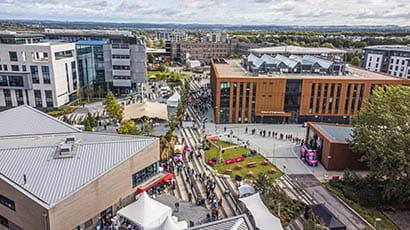
09 May 2025
UWE Bristol among first universities in UK to introduce sanitary waste bins in male toilets
UWE Bristol is among the first universities in the UK to introduce sanitary waste bins in male toilets for the disposal of incontinence products.
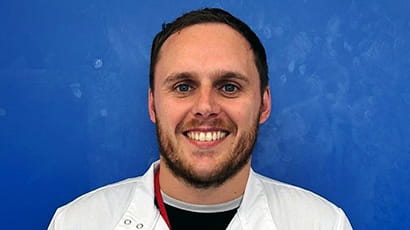
11 April 2025
UWE Bristol academics among emerging scientific leaders to receive share of £7.6m for health research
Two UWE Bristol researchers are among the recipients of a £7.6 million investment from the Academy of Medical Sciences aimed at tackling urgent health challenges.
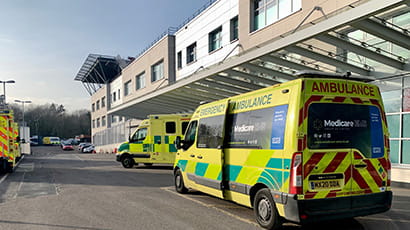
09 April 2025
New research to support a thriving health and care workforce is launched
A national research partnership will explore ways to support wellbeing and sustainability in the NHS and social care same day and urgent care workforce.

10 March 2025
UWE Bristol to explore the power of open water swimming at upcoming event with The Wave founder Nick Hounsfield
An inspiring tale of grit and resilience will be told to audiences at the first BDAS event of 2025 as UWE Bristol welcomes Nick Hounsfield, founder of The Wave.
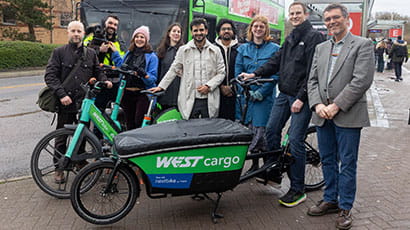
24 February 2025
WESTbusStop+ makes sustainable travel more convenient
A new WESTbusStop+ bringing together buses and other ways to travel has been officially opened at UWE Bristol’s Frenchay campus.
You may also be interested in

Media enquiries
Enquiries related to news releases and press and contacts for the media team.
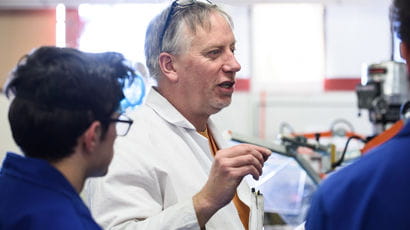
Find an expert
Media contacts are invited to check out the vast range of subjects where UWE Bristol can offer up expert commentary.
College of Health, Science and Society
The College of Health, Science and Society is a large, diverse and dynamic part of the University, bringing together experts from Health and Social Wellbeing, Applied Sciences, Education and Social Sciences






